ADATA SP550 M.2 240GB Solid State Drive Review
Bohs Hansen / 8 years ago
Introduction
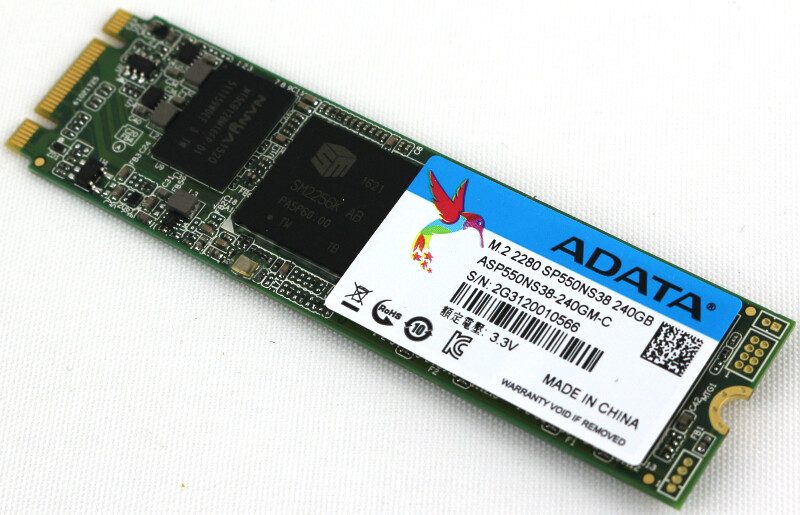
It is time to take a look at another M.2 2280 sized SSD, my favourite storage form factor. It is tiny yet features plenty of PCB space for large capacities and reduces the cable clutter in your system by eliminating the normal SATA data and power cables. The M.2 drive that I’ll be testing today is the ADATA SP550 with a 240GB capacity. Other capacity options for this drive includes a 120GB and a 480GB version.
The drive has been designed for ultrabooks and slim notebooks and the M.2 form factor drives are a perfect solution here. They’re light and small enough to offer fit into these thin systems and we’ve already seen drives on the market with up to 2TB capacity. While this drive doesn’t offer that much, we need to keep in mind that not everyone needs a lot of local storage in their portable system.

The SP550 is built with a Silicon Motion SM2256 controllers which were the first commercially available controller and firmware combination built with TLC in mind. From that statement, we also know that this is a TLC based drive.
The SP550 features an intelligent SLC caching technology and DRAM Cache Buffer which allows it to boost read/write speeds on demand based on task. It also supports LDPC ECC Engine, RAID Engine, and Data Shaping for enhancement of reliability of data transfer and overall system stability.

In pure numbers, the ADATA SP550 M.2 is rated for up to 560MB/s sequential reads and 510MB/s writes. The random performance, both read and write, is rated at 75K IOPS. While TLC might have a lower endurance rating than MLC, the drive still comes with a mean time before failure of 1.5 million hours.
This drive has been designed with ultrabooks in mind, as said above, and as such it is important that it has the proper features such as Device Sleep (DevSleep/DEVSLP). While SSDs only consume a small amount of power as is, they’ll still use the battery on your portable device and we want to limit that as much as possible. Device Sleep put the drive into the deepest sleep state possible, when your laptop is doing the same, resulting in the lowest possible power consumption while it remains available.
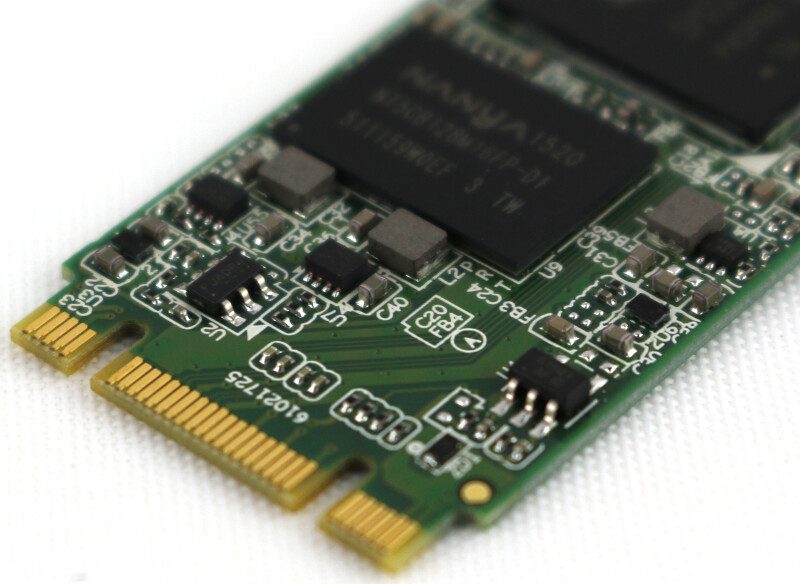
Performance is one side of a drive, but the rest has to match too. The ADATA Premier SP550 M.2 2280 supports RAID Engine and Data Shaping which both ensures data integrity and deliver extended SSD lifespan for better, longer-lasting stability and return on investment. It also features an advanced LDPC ECC Engine technology for reliability with strong data protection.
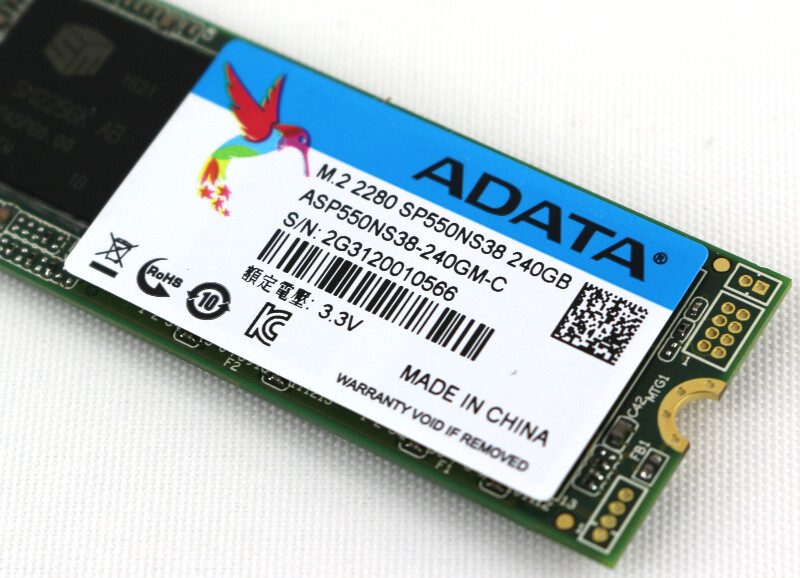
The downloadable SSD Toolbox software suite is a nice bonus to any drive. It helps users quickly and conveniently configure, optimize, and monitor the overall status and health of solid state drives, covering system set up, secure erase, and firmware updates.
Feature Highlights
- Ultra compact M.2 2280 form factor
- DEVSLP (Device Sleep) supported
- Advanced hardware LDPC ECC technology
- DRAM Cache Buffer
- SLC Caching
- RAID Engine and Data Shaping
- Free value-added ADATA SSD Toolbox software
Packaging
The package isn’t much larger than the drive itself, but it is a nice retail package. The front displays how the drive looks as well as the capacity and form factor.
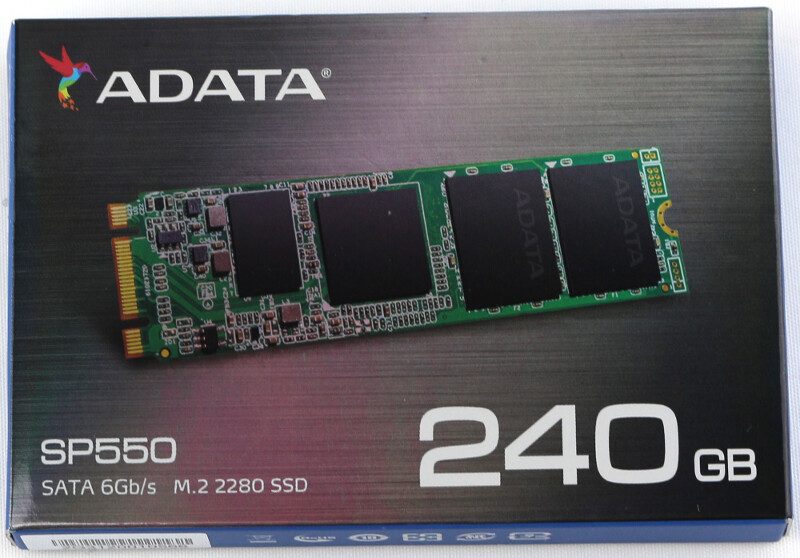
The rear has some more details on features and easy-to-scan QR codes for the registration of the product inside.
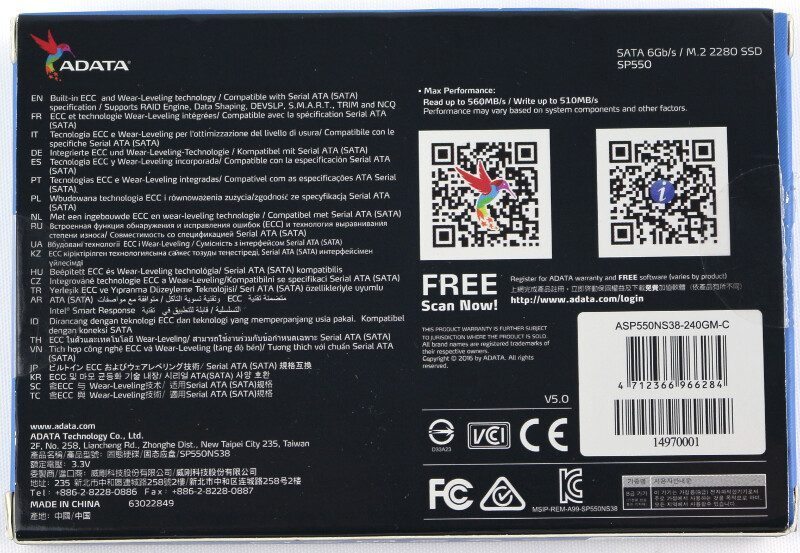
Testing & Methodology
Hardware
- Gigabyte Z79X UD5H-BK
- Intel Core i7-4790K
- G.Skill Ares DDR3 1866MHz (2x4GB)
- OCZ Vertex4 256GB
- CoolerMaster Silent Pro Hybrid 850W
- NZXT Kraken X60
- Dimastech Easy V3
Software
- AIDA64 Storage Benchmark
- Anvil’s Storage Utilities
- AS SSD Benchmark
- ATTO Benchmark
- CrystalDiskMark
- IOMeter
- PCMark 8 Storage Benchmark
- Windows 10
In a bid to make our testing as thorough and as accurate as possible, we have devised a testing methodology that will give us the maximum amount of data. Whilst this means that testing each drive will take considerably longer – easily up 36 hours – the overall picture that we can gather from this helps us and you as the reader to gain a clearer picture of the drive’s overall performance, strengths, and weaknesses and it provides a more accurate analysis at each drive performs under different conditions.
There are many ways to test a storage drive and we have chosen to include close to every test possible. We will start with a normal benchmark analysis of the formatted drive with various fillage scenarios. Depending on how a drive is built, it might perform differently depending on how much data it already is storing. To test this, the drive will be tested empty as well as with 25%, 50%, and 75% space usage. For these tests, we will be using Anvil’s Storage Utilities, AS SSD Benchmark, ATTO Benchmark, and CrystalDiskMark. Besides these synthetic fill tests, the drive will also be tested with PCMark 8’s storage benchmark in order to get real-world performance results.
Following the fillage tests, the partition will be removed and we test the drive’s raw performance. These tests will determine the hardware’s capabilities while removing any interference from the set file system. AIDA64’s storage benchmark and IOmeter are both great tools for this and they help us paint an even clearer picture of the drive. The IOmeter tests I run are quite different from the rest as they will give a final result after a longer performance test rather than a maximum or average score. This gives us yet another view of the tested drive over the ordinary tests.
Durability is a vital factor when it comes to NAND-based drives as the chips only can be rewritten so many times before they’ll stop working properly. Modern SSDs come with wear-level algorithms to increase the lifetime and reduce this factor as much as possible. We also take this into consideration in our reviews even tho it would take years to simulate this under real-world conditions. Luckily, Anvil’s Storage Utilities comes with an endurance test that can perform this action much faster, but it is still a time-consuming process. process. Depending on the hardware, this can easily take several days and we write thousands and thousands of small files in various sizes and compressibility to drive over and over.
Following this conditioning process, all of the previous benchmarks will be run again in the same scenarios and in the same order. This will give us a great view on how a drive will perform after prolonged usage and that is a very vital factor when you pick out your storage drive.
Modern operating systems all take care of the TRIM command in the background and it isn’t something normal users need to worry about. However, For these reviews, I will add a waiting period between each benchmark to make sure that the TRIM command has been fully executed and finished. After all, we want a clear picture of the drives performance with minimal interference from the operating system.
On each page that follows with the benchmark results, I have inserted result screenshots from the benchmarks, created drive analysis chart for the fill-level performance, and added drive comparison charts where possible.
AIDA64
AIDA64 is a streamlined Windows diagnostic and benchmarking software for home users. It provides a wide range of features to assist in overclocking, hardware error diagnosis, stress testing, and sensor monitoring.
It has unique capabilities to assess the performance of the processor, system memory, and disk drives and is compatible with most Microsoft Windows operating systems. It also has a disk benchmark tool, and that is the one I’ll be using.
Fresh Drive
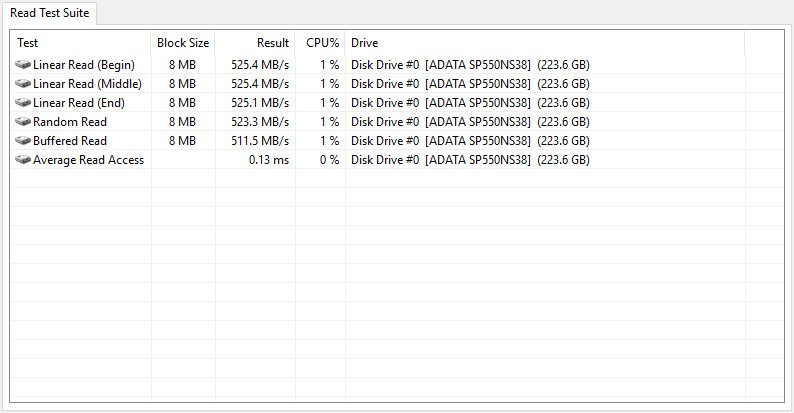
The Linear Read and Write tests measure the sequential performance by reading or writing all sectors without skipping any. It gives, as the name says, a linear view of the drives overall performance from start to end.
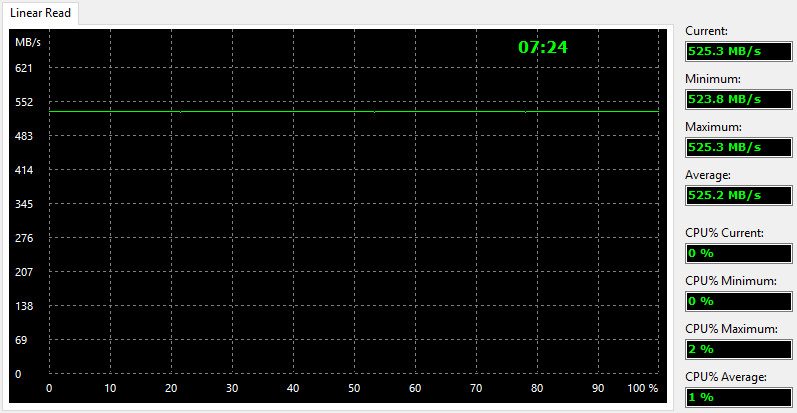
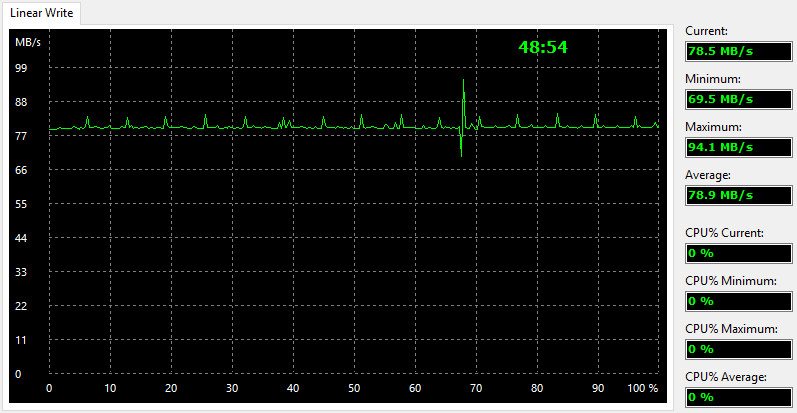
The Random Read and Write tests measure the random performance by reading or writing variable-sized data blocks at random locations on the surface of the drive. The Random tests are actually a combination of both speed and access times as it moves the position before each new operation.
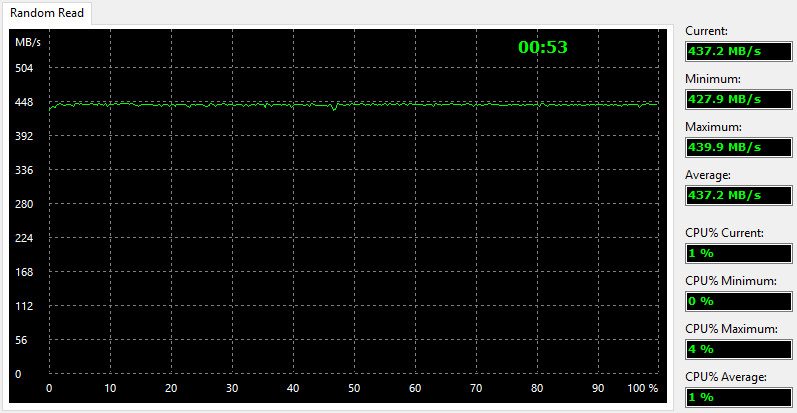
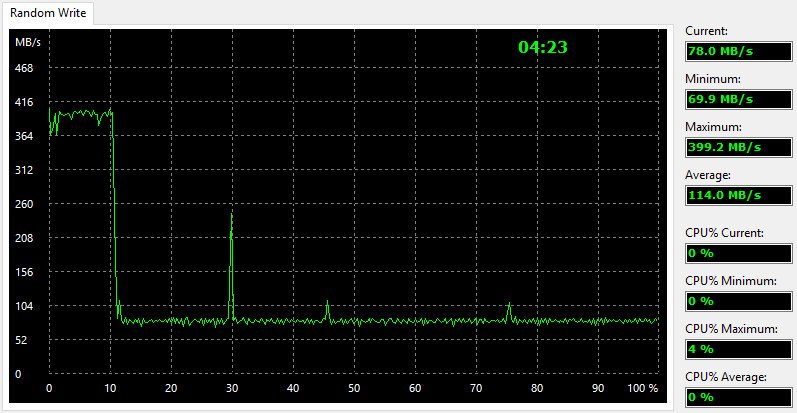
The Access time tests are designed to measure the data access performance by reading or writing small 0.5KB data blocks at random locations on the drive surface.
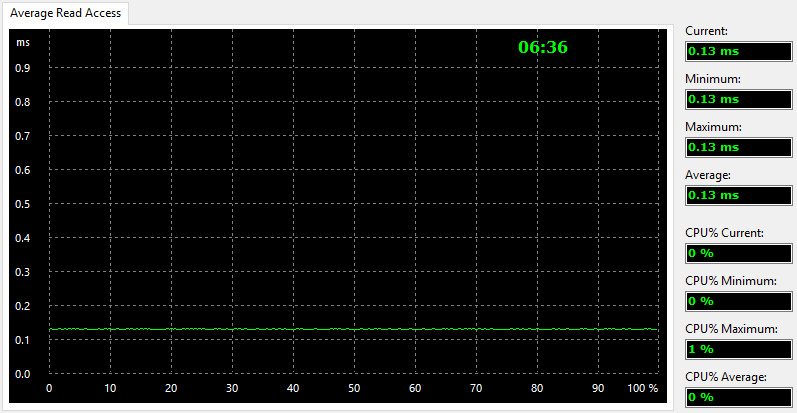
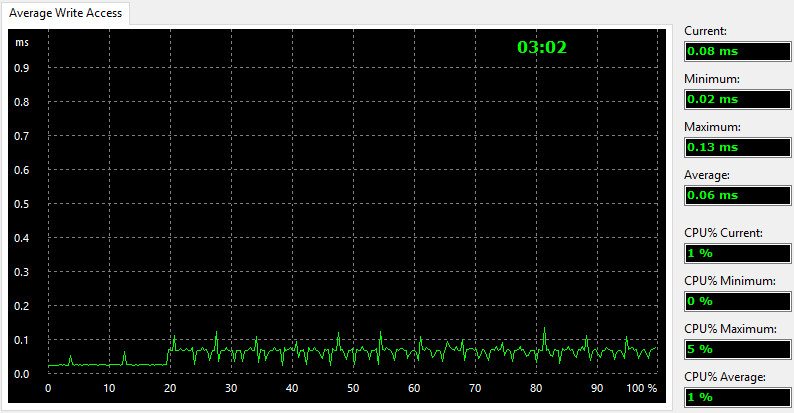
Conditioned Drive
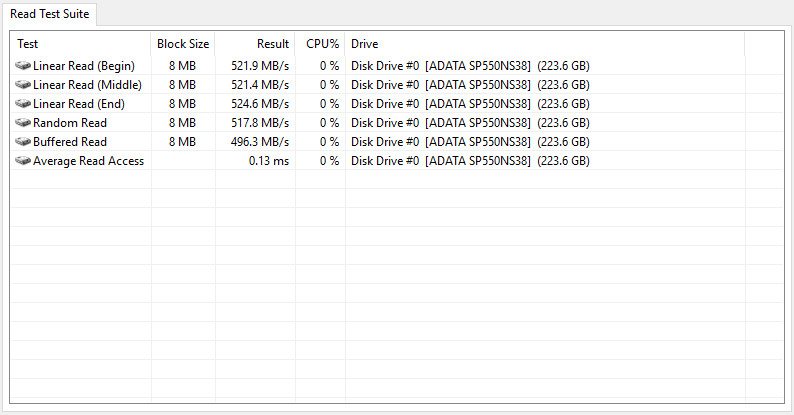
The Linear Read and Write tests measure the sequential performance by reading or writing all sectors without skipping any. It gives, as the name says, a linear view of the drives overall performance from start to end.
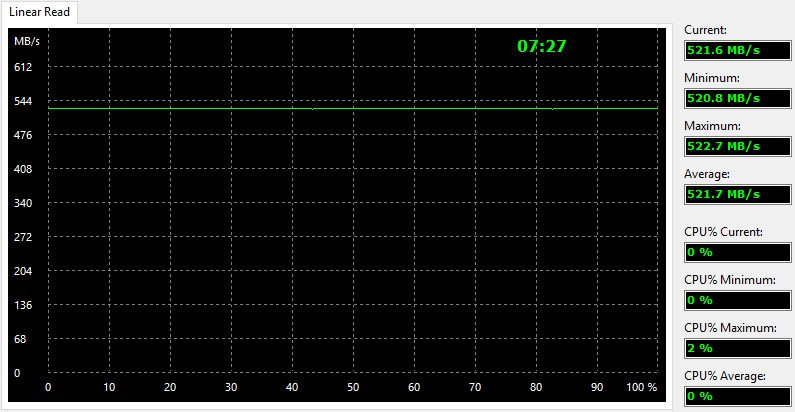
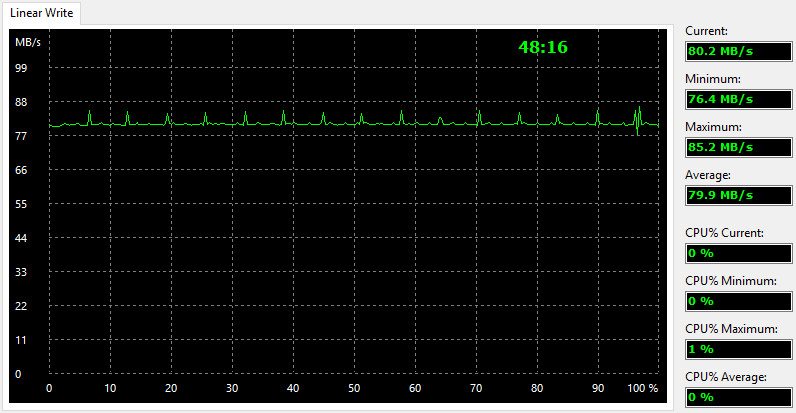
The Random Read and Write tests measure the random performance by reading or writing variable-sized data blocks at random locations on the surface of the drive. The Random tests are actually a combination of both speed and access times as it moves the position before each new operation.
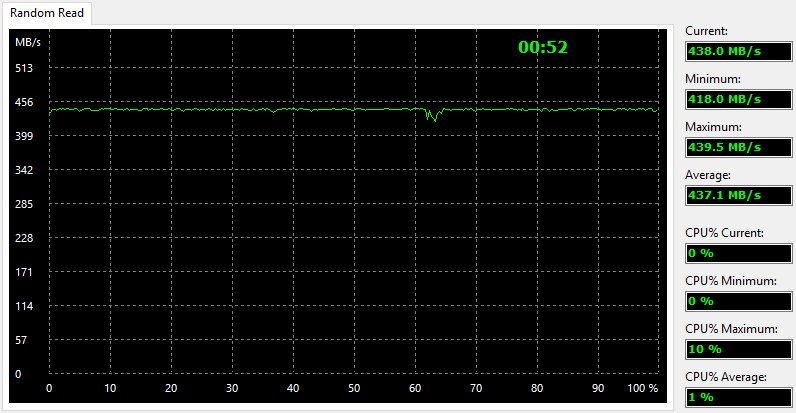
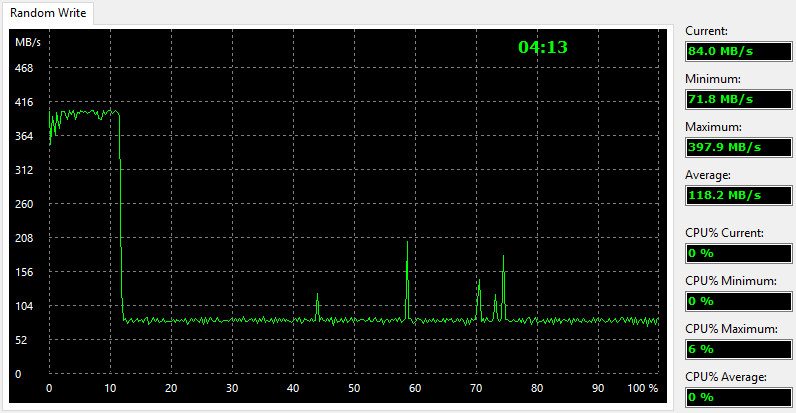
The Access time tests are designed to measure the data access performance by reading or writing small 0.5KB data blocks at random locations on the drive surface.
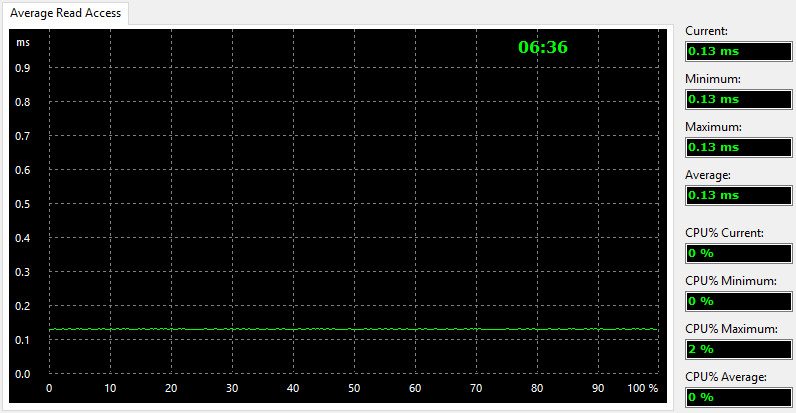
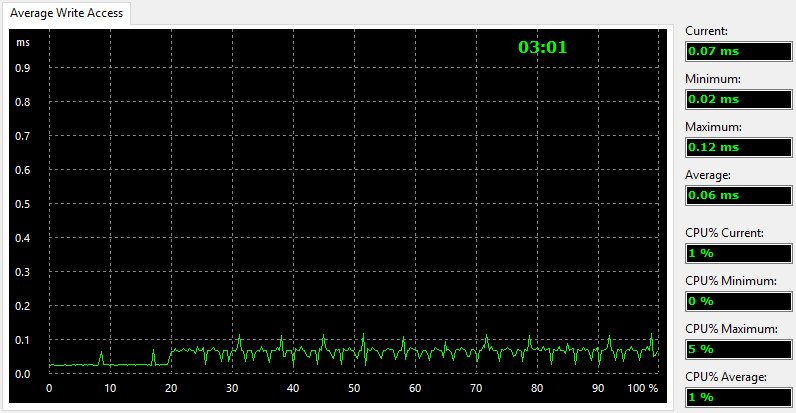
Anvil’s Storage Utilities
Anvil’s Storage Utilities is a new benchmarking utility that we have started using here at eTeknix, it’s completely free to download and has the ability to test mainly hard drives and solid state drives, but also any other form of storage medium that you can throw at it.
As well as testing the drive in a variety of benchmarking tests, it also has a drive endurance test that consistently reads and writes data to the selected medium to give days, months and potentially even years of use in a shorter period of time to see how the drive copes in the longer term.
Fresh Drive
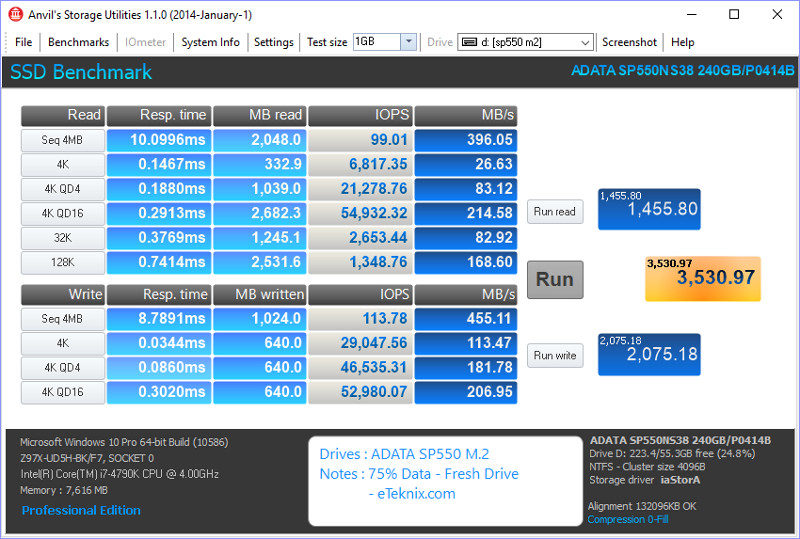
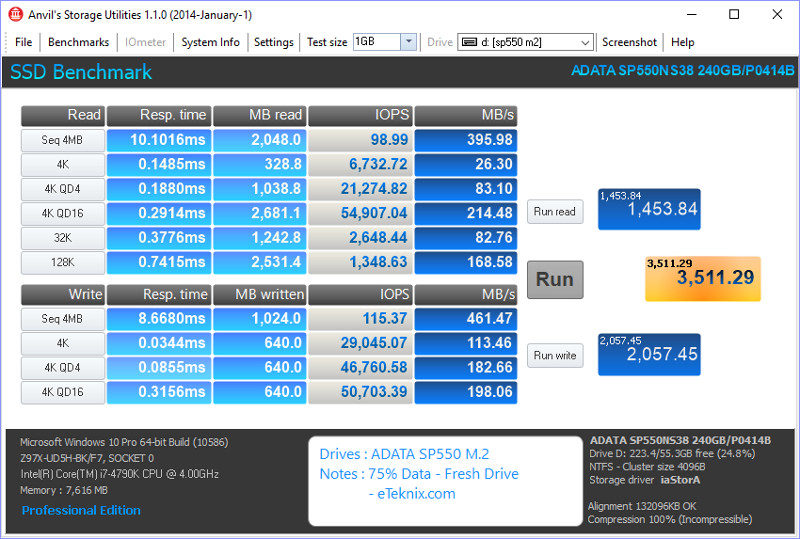
Conditioned Drive
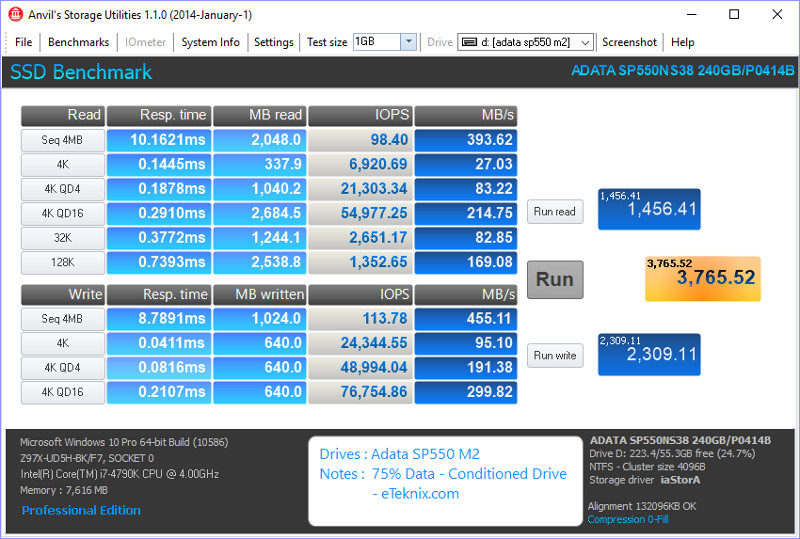
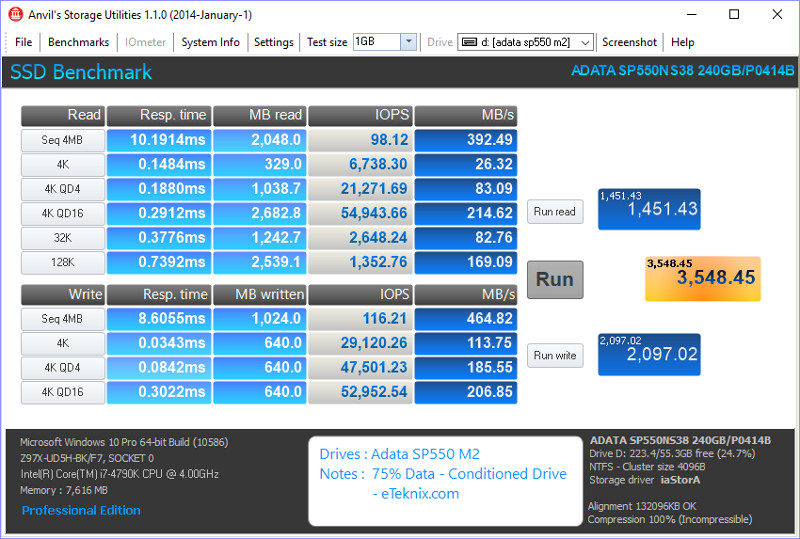
Drive Performance Analysis
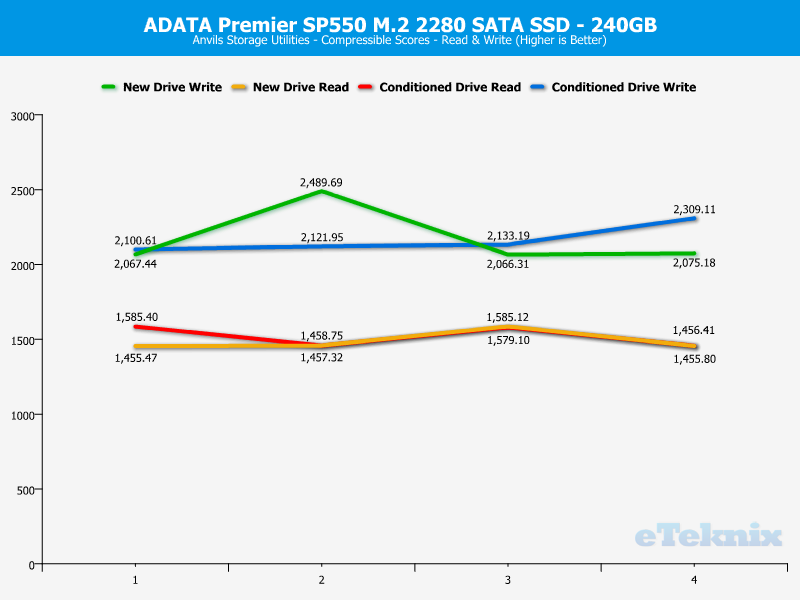
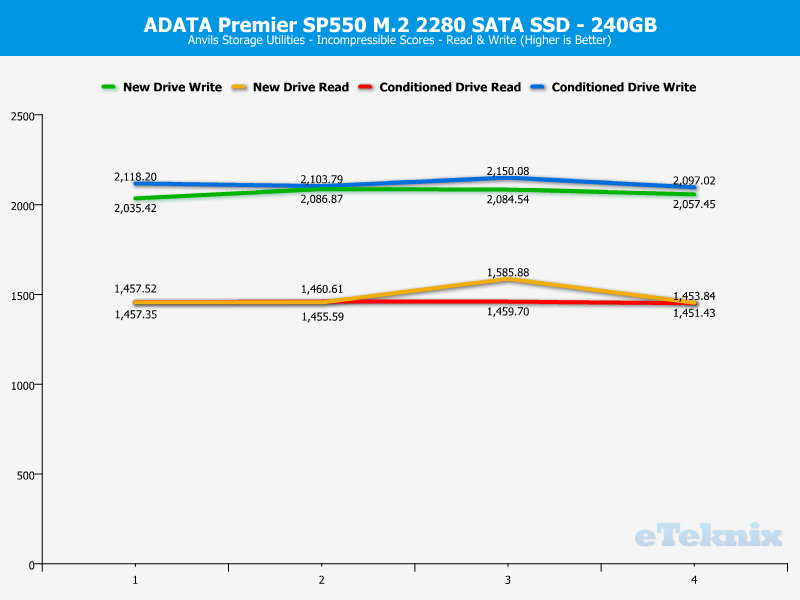
Drive Comparison
For the purpose of drive comparison, I will be using the performance figures from both unconditioned and conditioned tests with 0% data-fill.
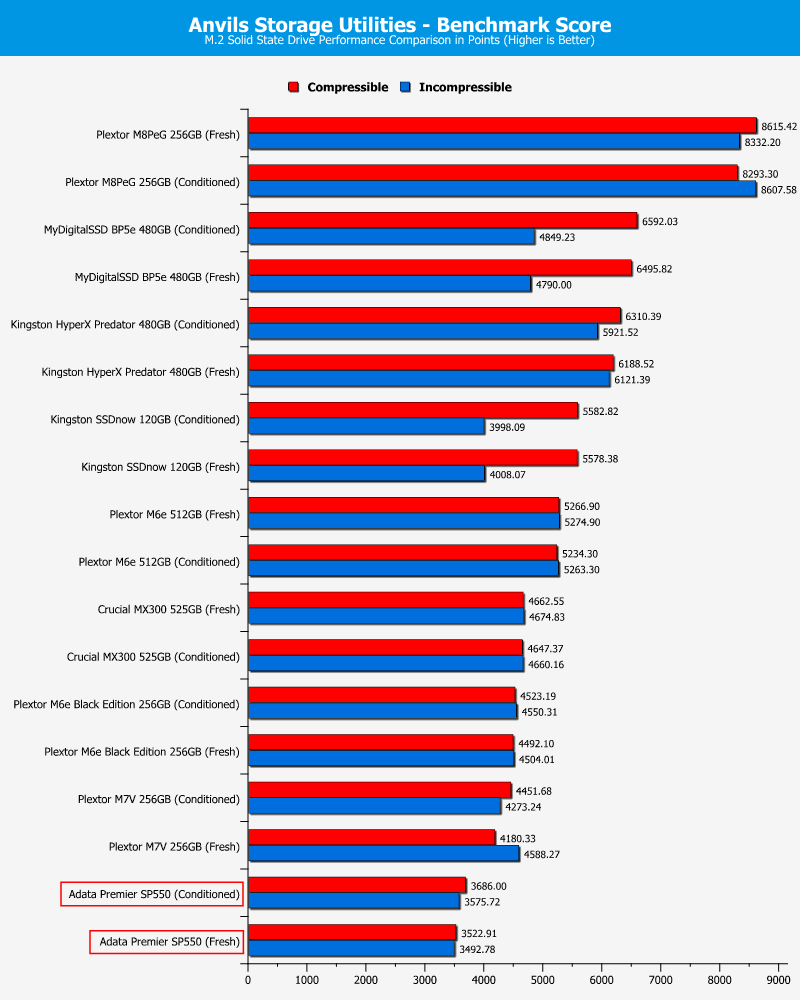
AS SSD
The AS SSD software determines the performance of Solid State Drives (SSD). The tool contains five synthetic and three practice tests. The synthetic tests determine the sequential and random read and write performance of the SSD. These tests are performed without using the operating system caches. In Sequential tests, the program measures the time it takes to read and write a 1 GB file respectively. To give a clearer picture of the drives tested, I’ve chosen to include all tests. Special the copy test is one that I think is relevant on the consumer level as it gives the user a view into one of the operations he’s going to do many times.
Fresh Drive
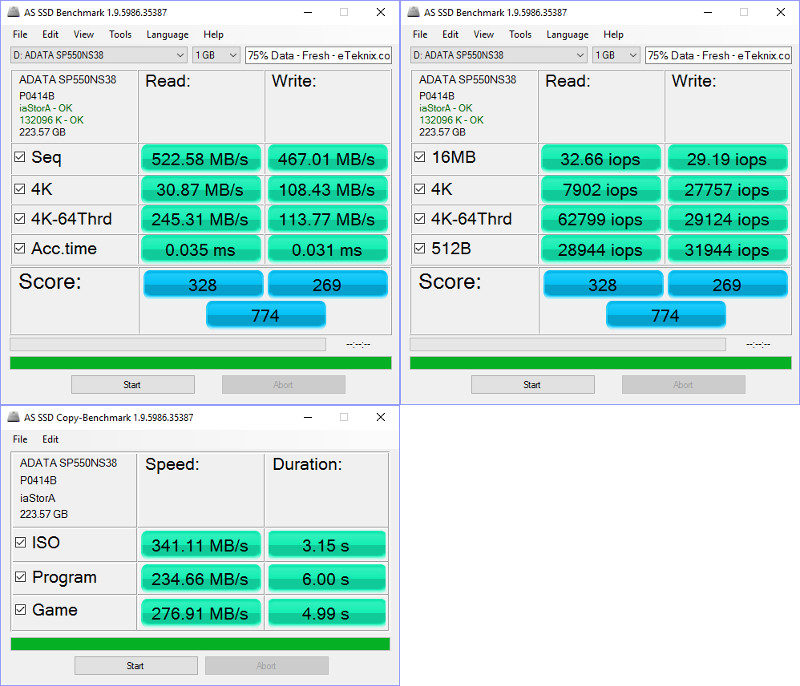
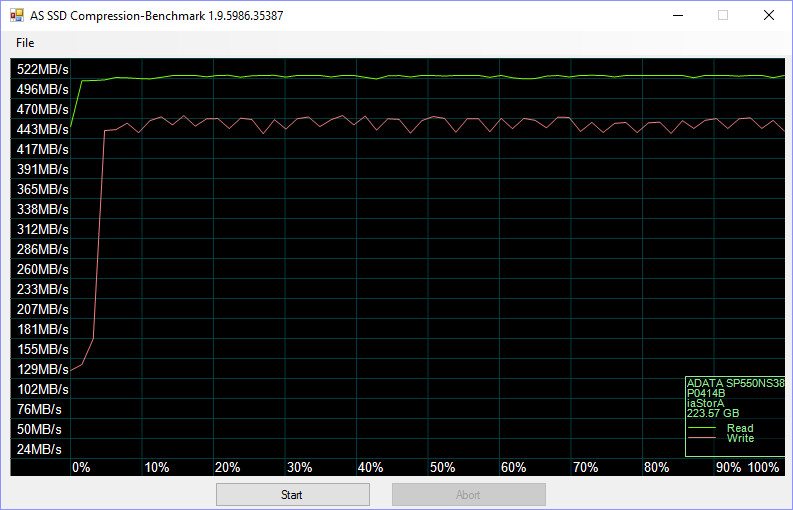
Conditioned
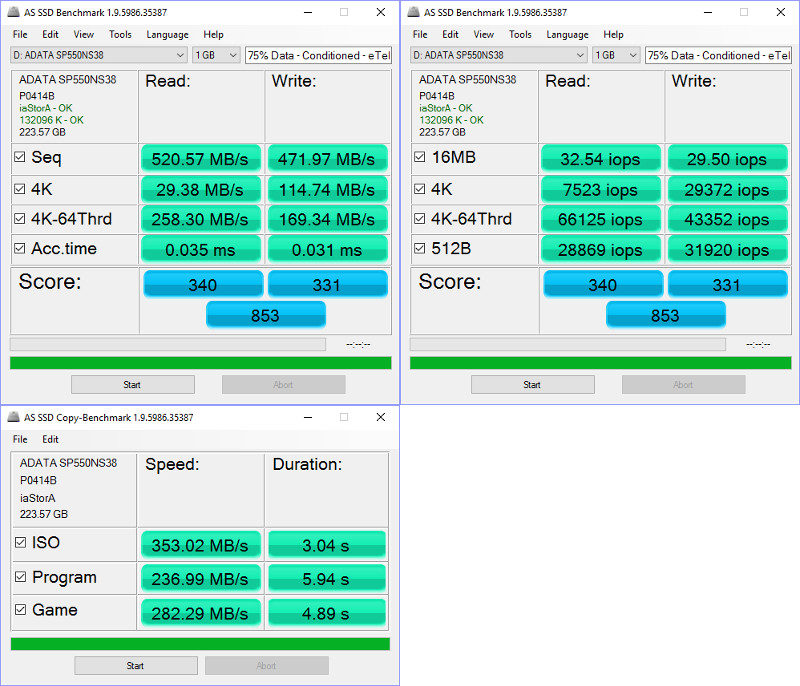
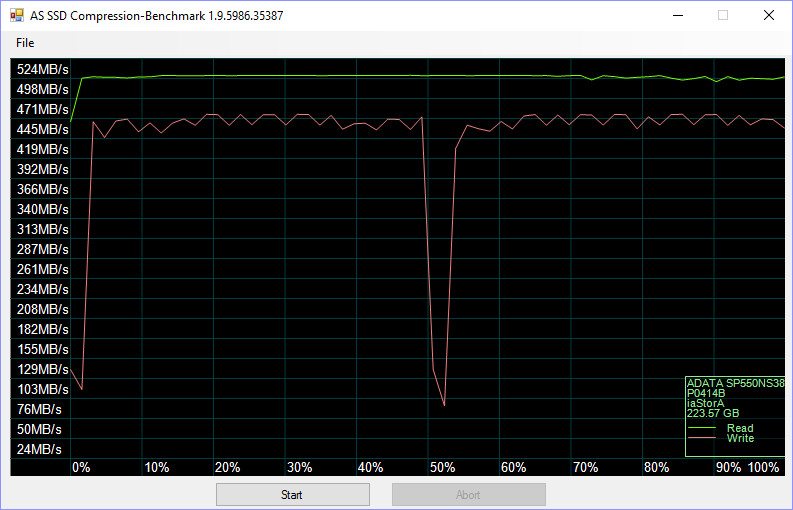
Drive Performance Analysis
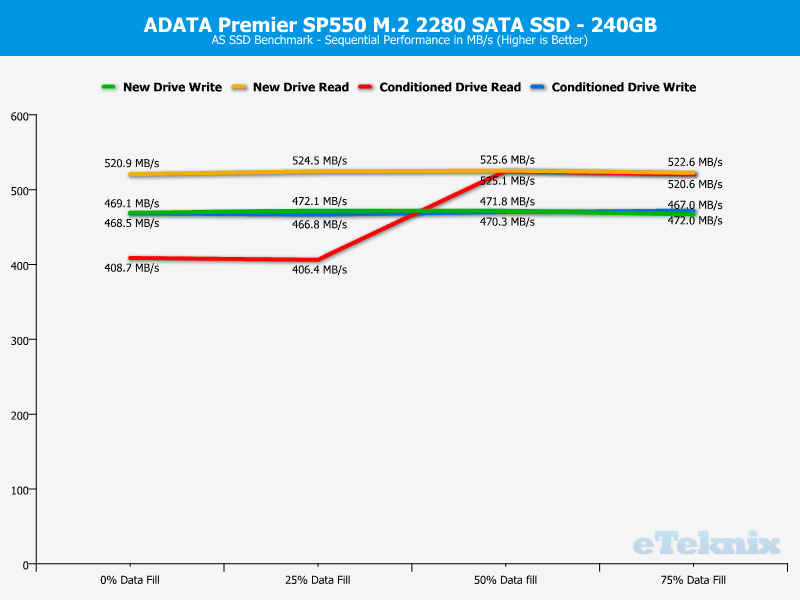
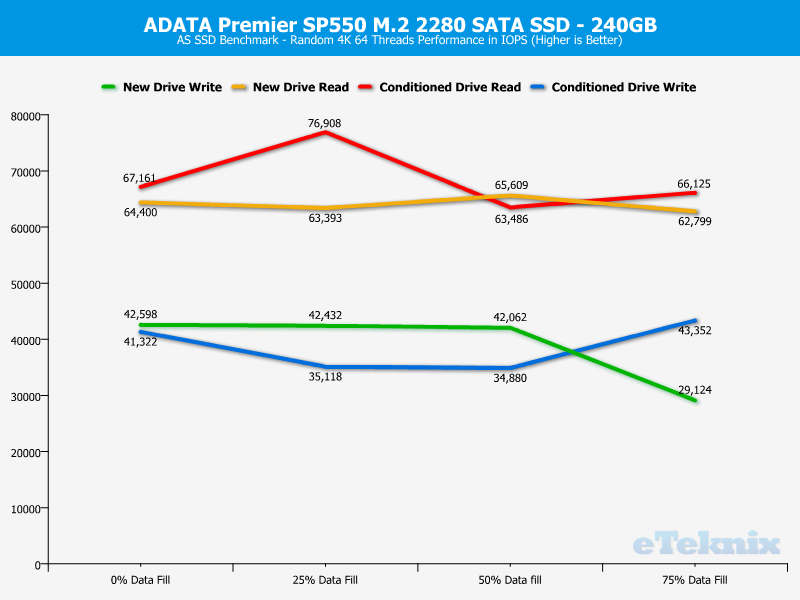
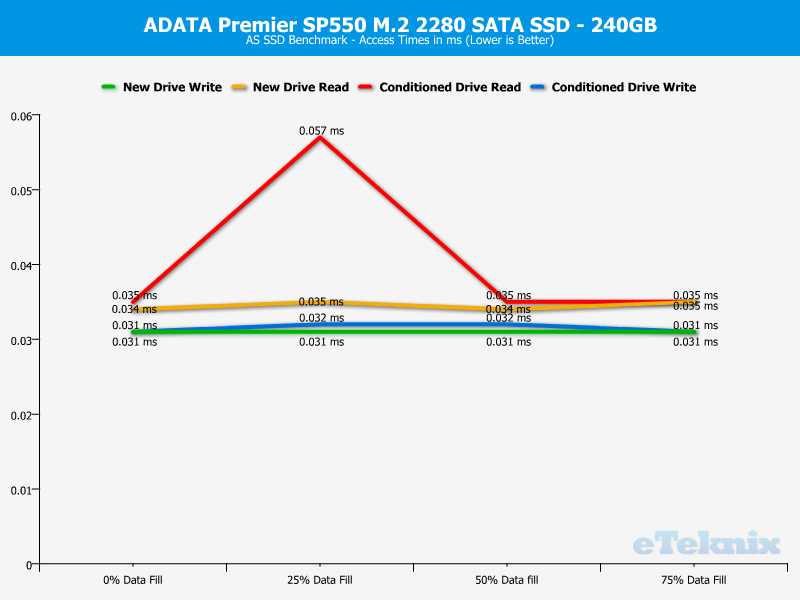
Drive Comparison
For the purpose of drive comparison, I will be using the performance figures from both unconditioned and conditioned tests with 0% data-fill.
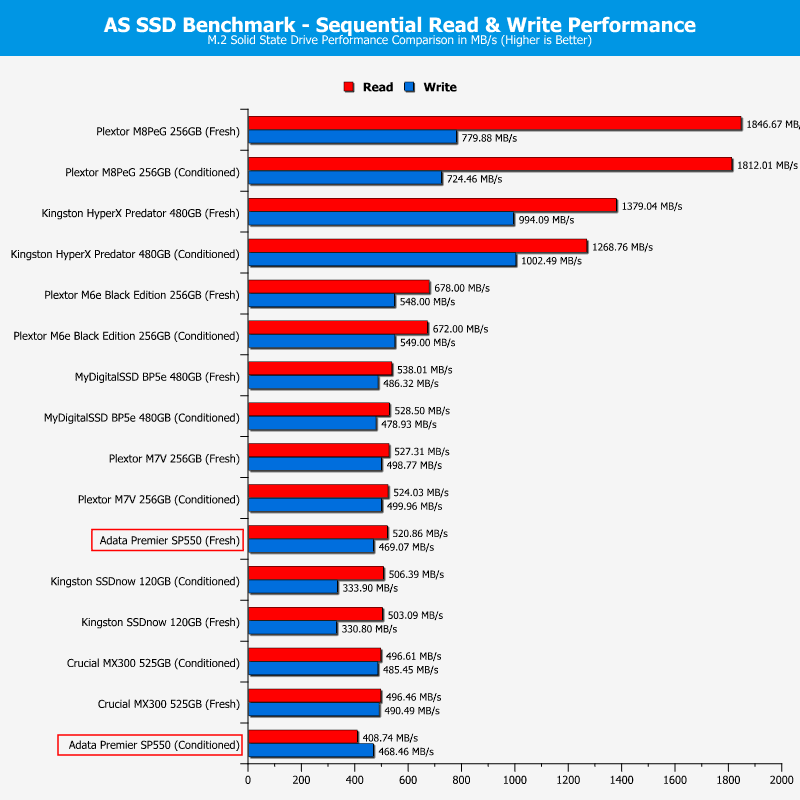
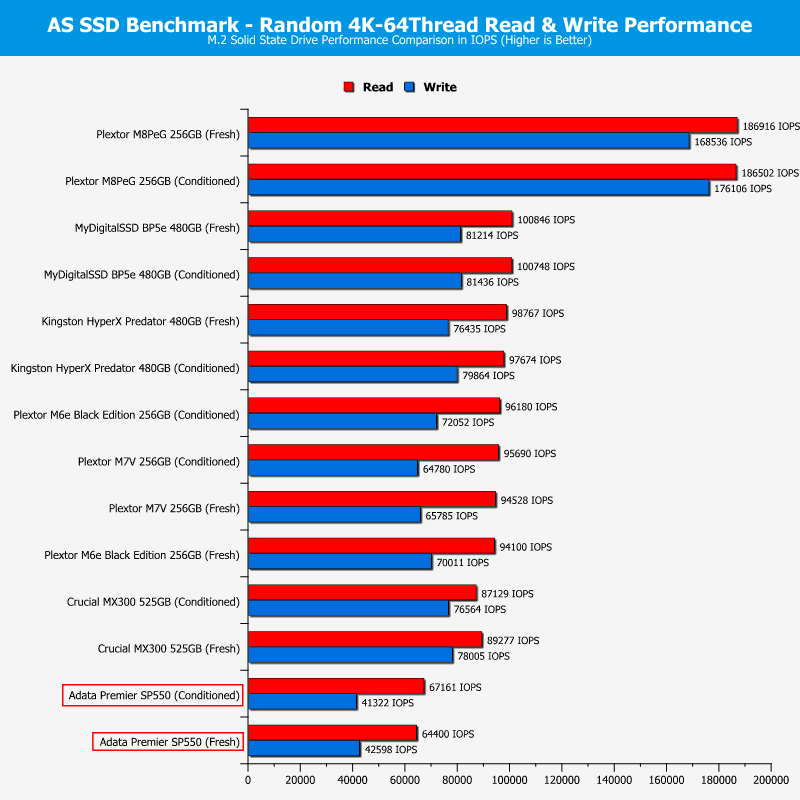
ATTO
The ATTO Disk Benchmark performance measurement tool is compatible with Microsoft Windows. Measure your storage systems performance with various transfer sizes and test lengths for reads and writes. Several options are available to customize your performance measurement including queue depth, overlapped I/O and even a comparison mode with the option to run continuously. Use ATTO Disk Benchmark to test any manufacturers RAID controllers, storage controllers, host adapters, hard drives and SSD drives and notice that ATTO products will consistently provide the highest level of performance to your storage.
Fresh Drive
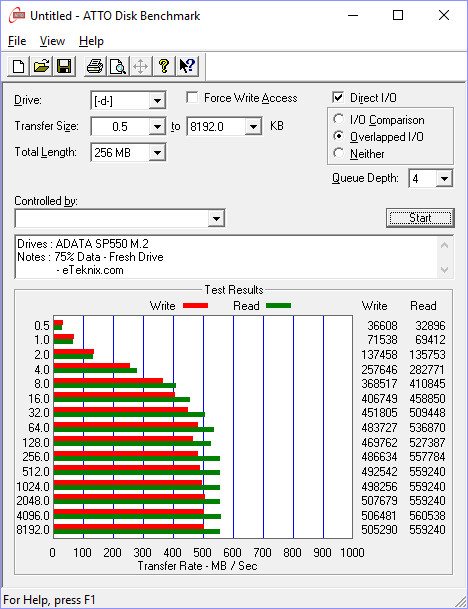
Conditioned
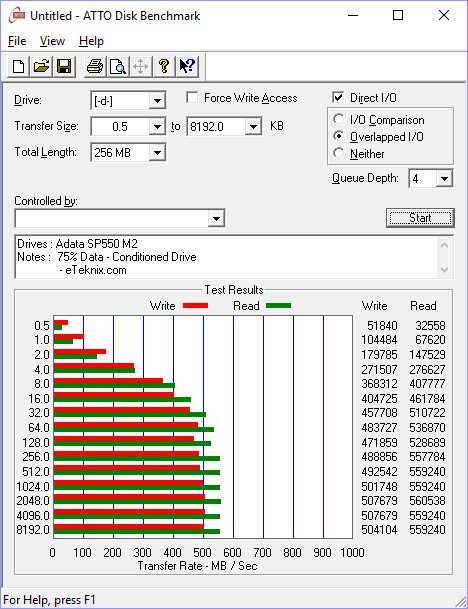
Drive Performance Analysis
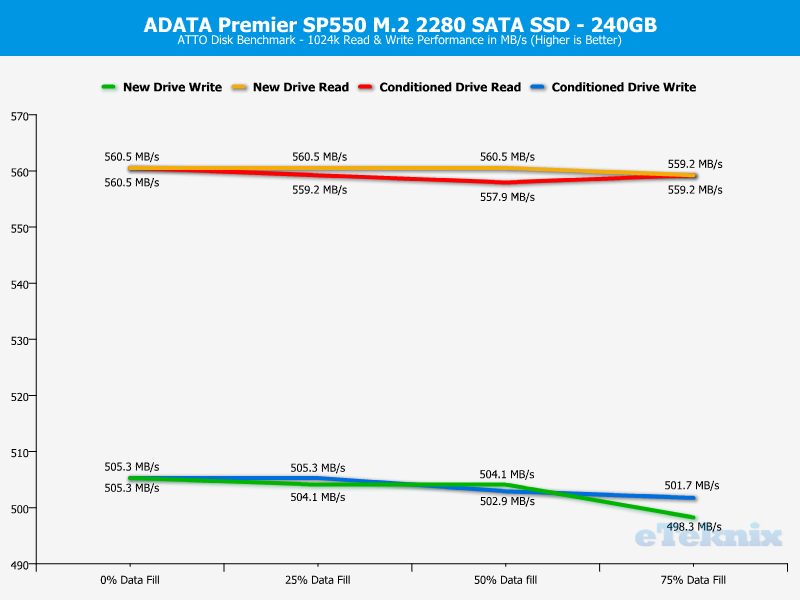
Drive Comparison
For the purpose of drive comparison, I will be using the performance figures from both unconditioned and conditioned tests with 0% data-fill.
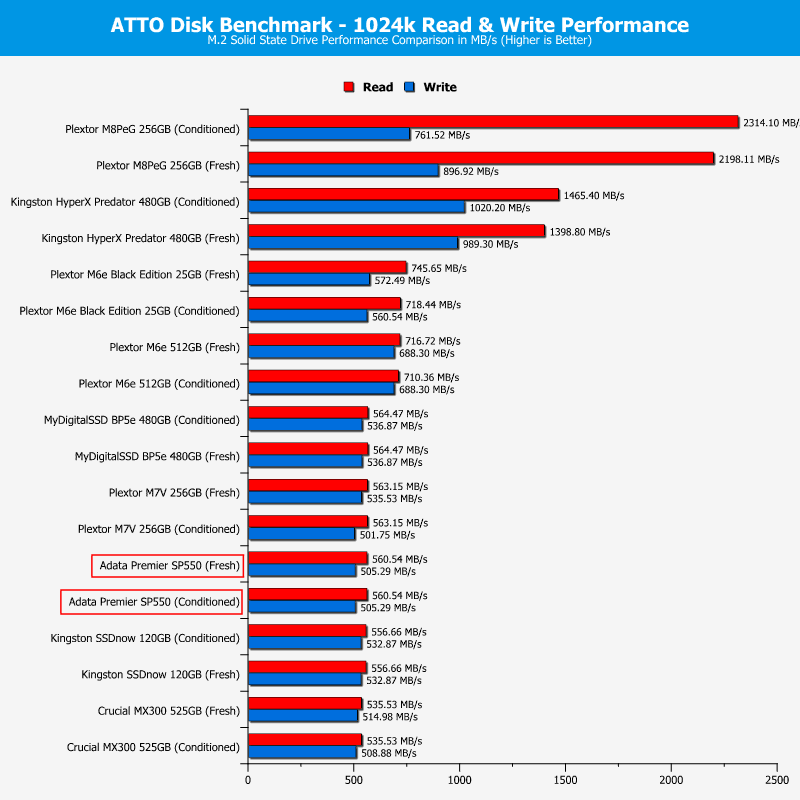
CrystalDiskMark
CrystalDiskMark is a small HDD benchmark utility for your hard drive that enables you to rapidly measure sequential and random 4KB/512KB read/write speeds.
Fresh Drive
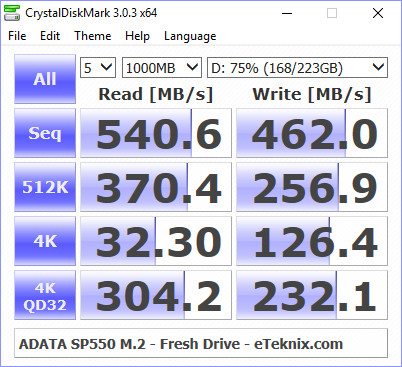
Conditioned
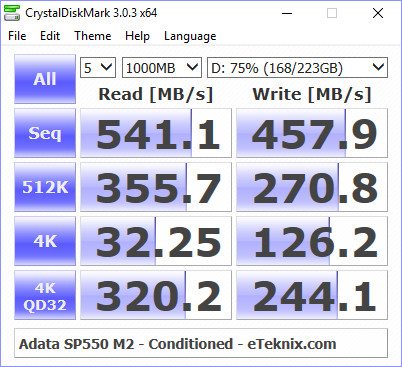
Drive Performance
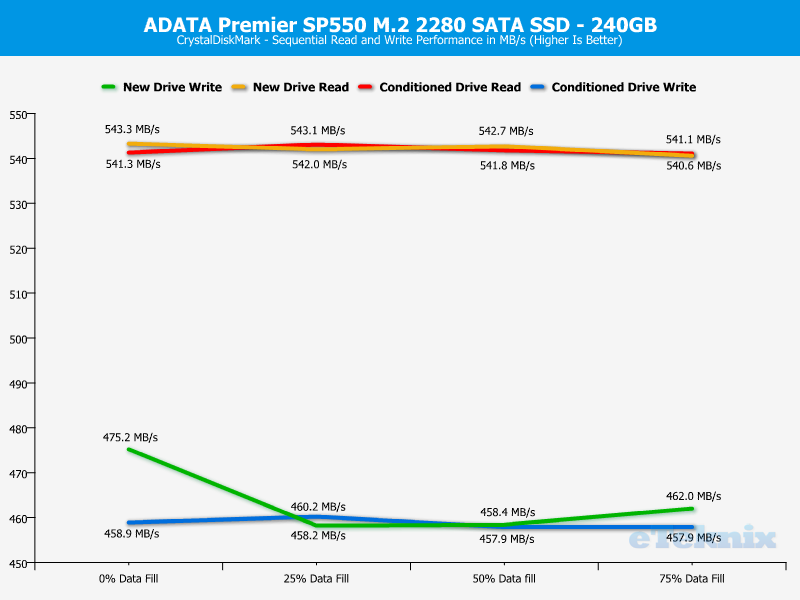
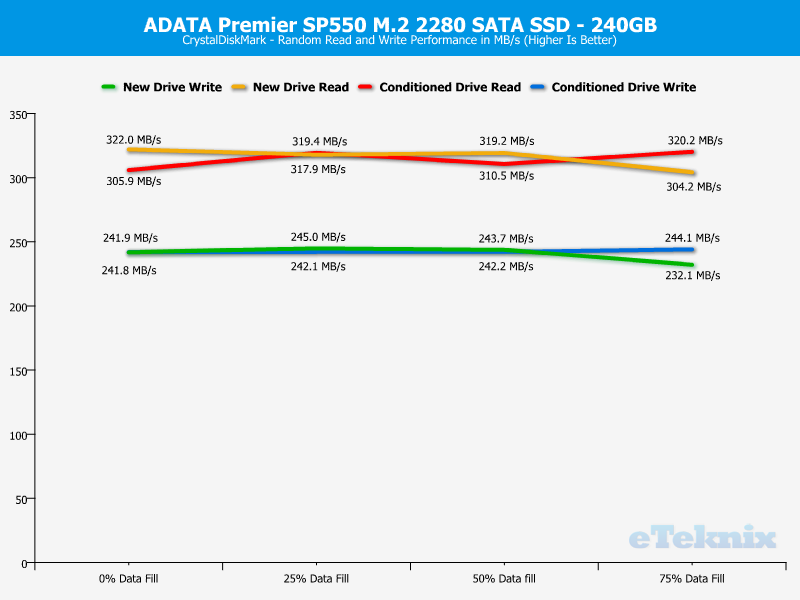
Drive Comparison
For the purpose of drive comparison, I will be using the performance figures from both unconditioned and conditioned tests with 0% data-fill.
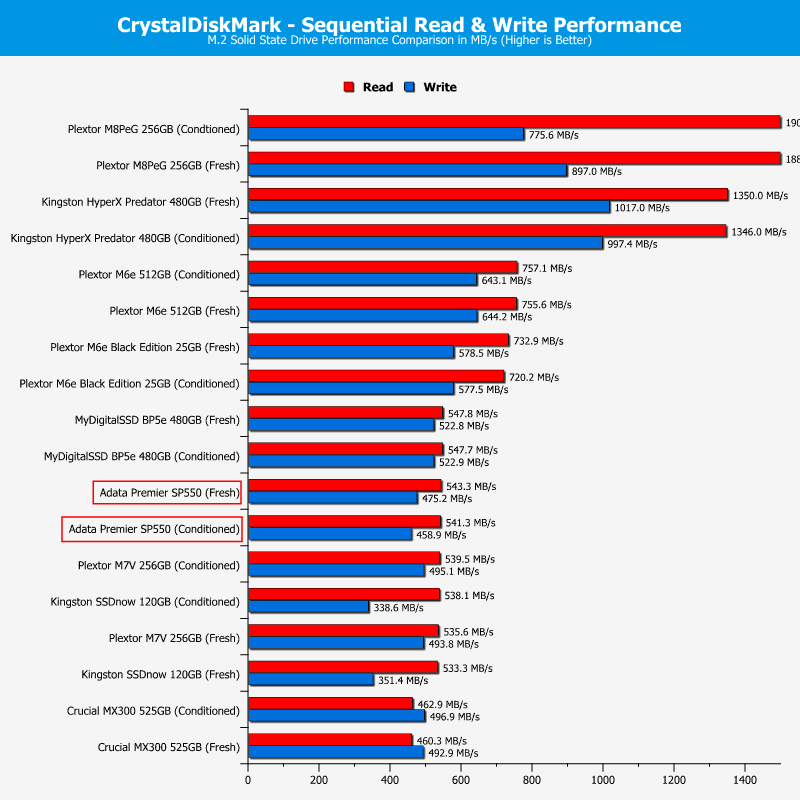
IOmeter & PCMark 8
IOmeter
OMeter is an I/O subsystem measurement and characterization tool for single and clustered systems. It is used as a benchmark and troubleshooting tool and is easily configured to replicate the behavior of many popular applications. One commonly quoted measurement provided by the tool is IOPS.
IOMeter allows the configuration of disk parameters such as the ‘Maximum Disk Size’, ‘Starting Disk Sector’ and ‘# of Outstanding I/Os’. This allows a user to configure a test file upon which the ‘Access Specifications’ configure the I/O types to the file. Configurable items within the Access Specifications are Transfer Request Size, Percent Random/Sequential distribution, Percent Read/Write Distribution, Aligned I/O’s, Reply Size, and TCP/IP status among others.
Sequential Performance
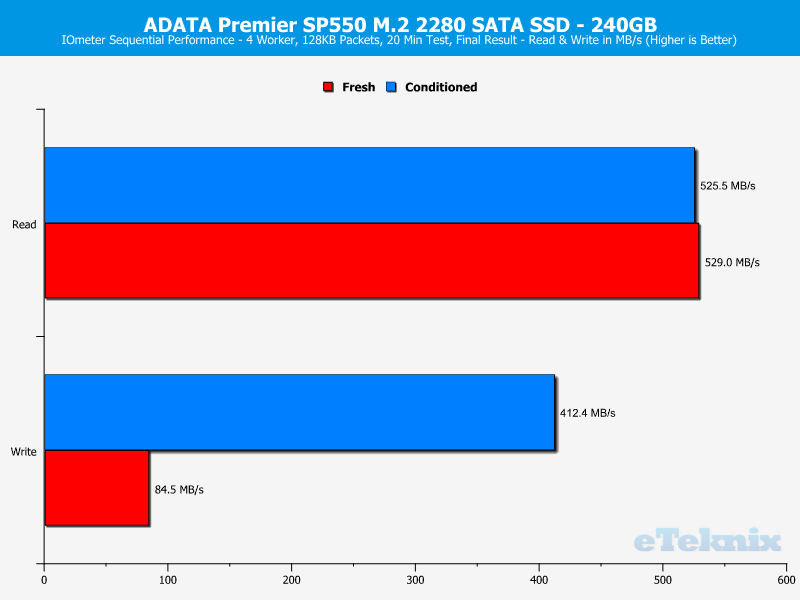
Random 4K Performance
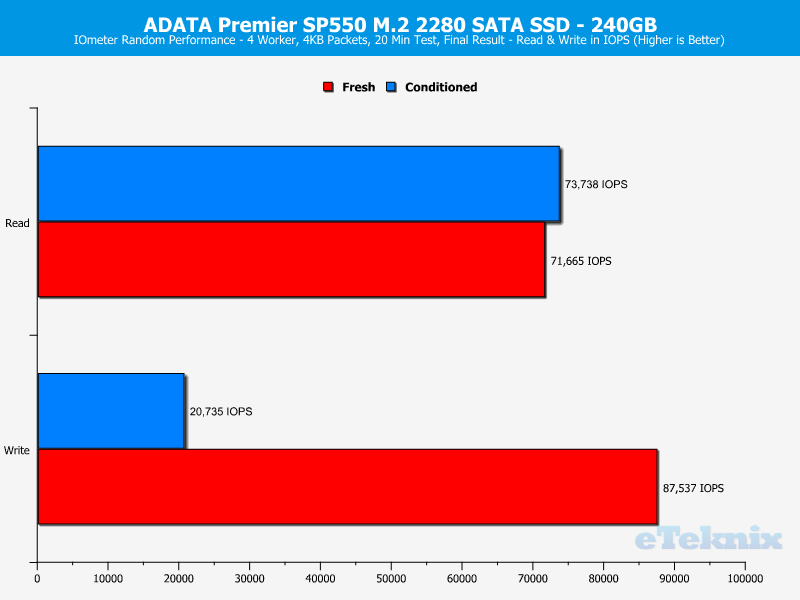
Drive Comparison
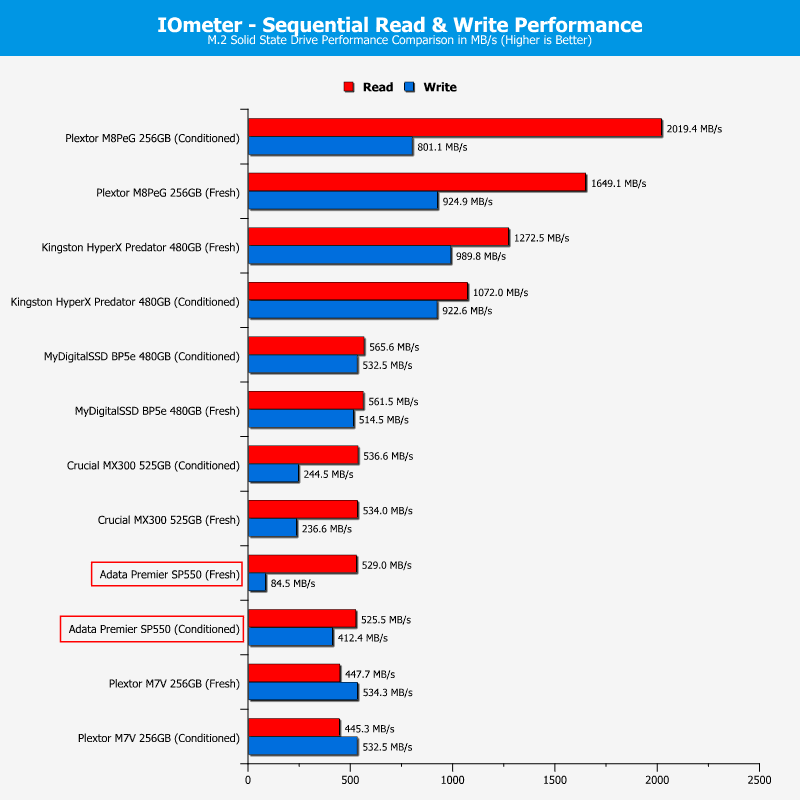
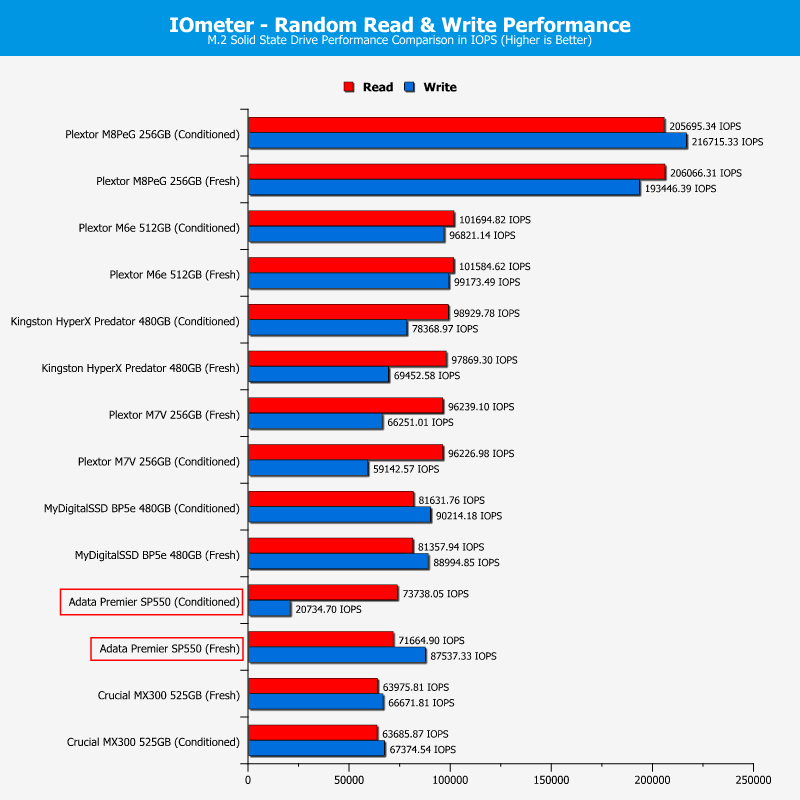
PCMark 8
PCMark 8 Storage benchmark is used test the performance of SSDs, HDDs, and hybrid drives with traces recorded from Adobe Creative Suite, Microsoft Office and a selection of popular games. You can test any recognized storage device, including local external drives. Unlike synthetic storage tests, the PCMark 8 Storage benchmark highlights real-world performance differences between storage devices.
Fresh Drive
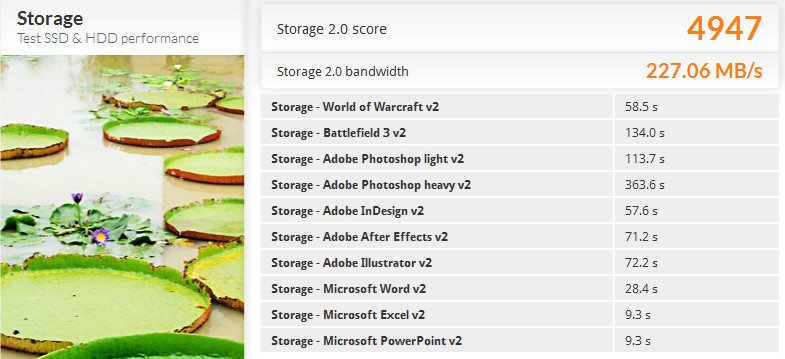
Conditioned Drive
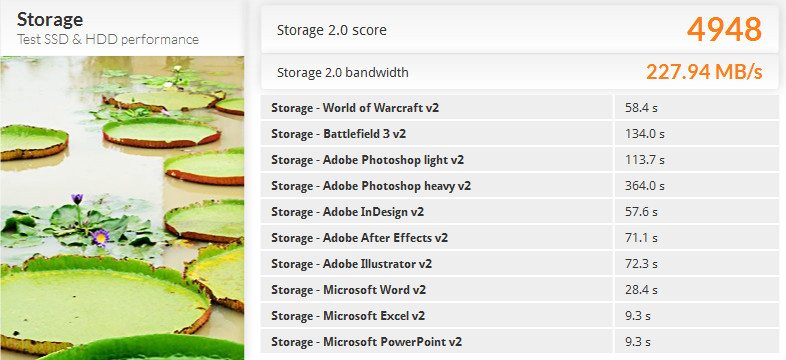
Drive Comparison
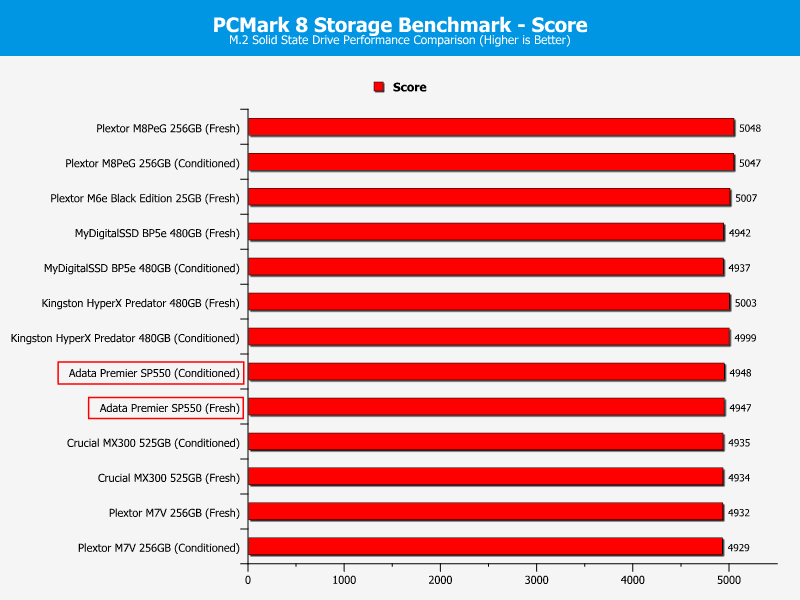
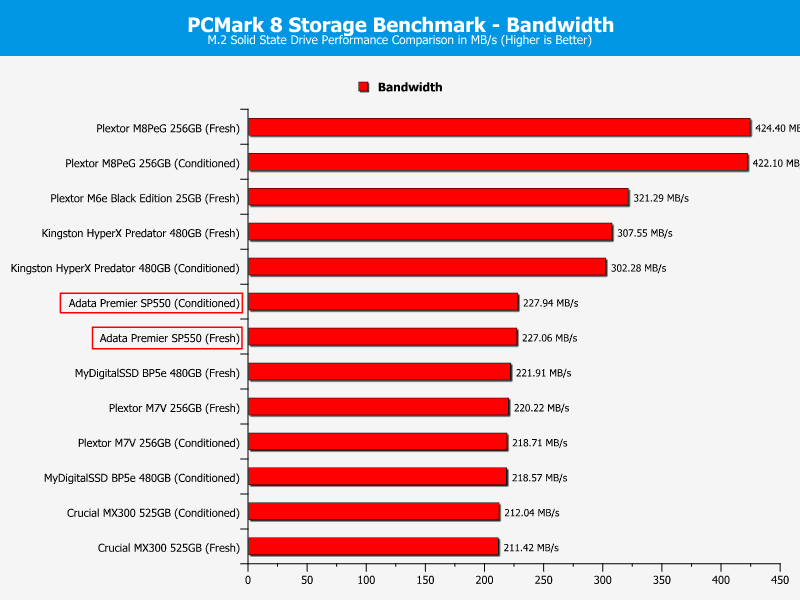
Software:
Adata also provides an SSD toolbox which can help and aid you with various tasks and provide information about your drives.
The initial page when opening the tool will show all installed drives and from here you can get a quick overview on the drive’s general state.
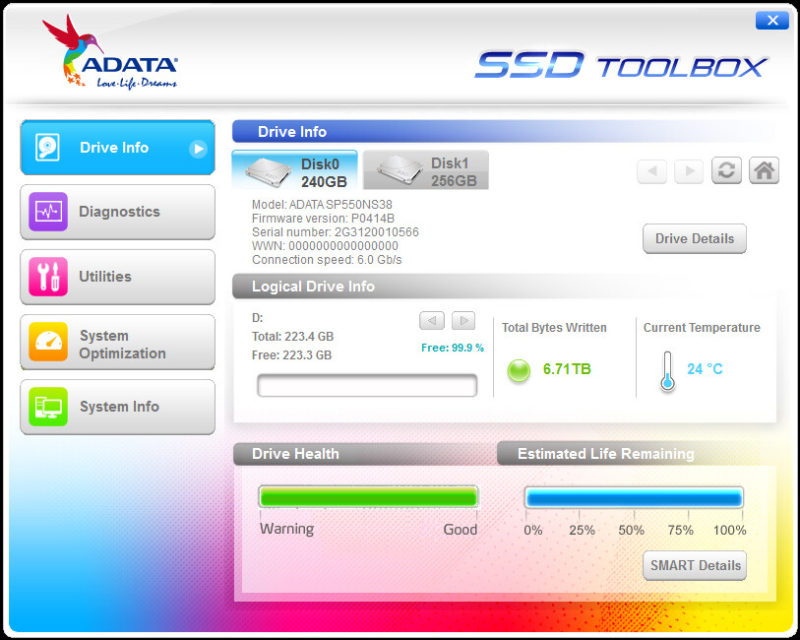
From the above page, you can get more details on the drive itself.
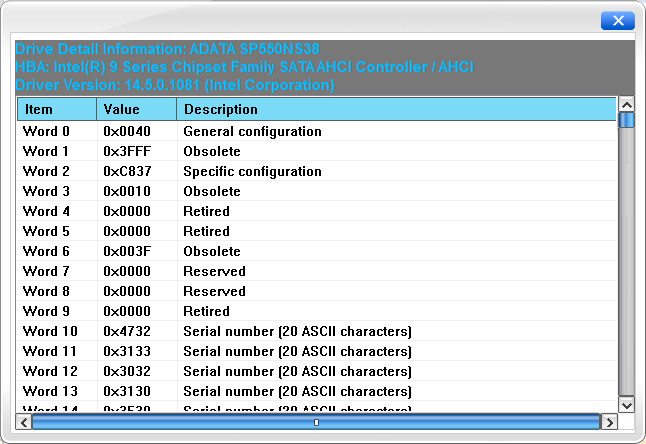
And also on all the SMART details.
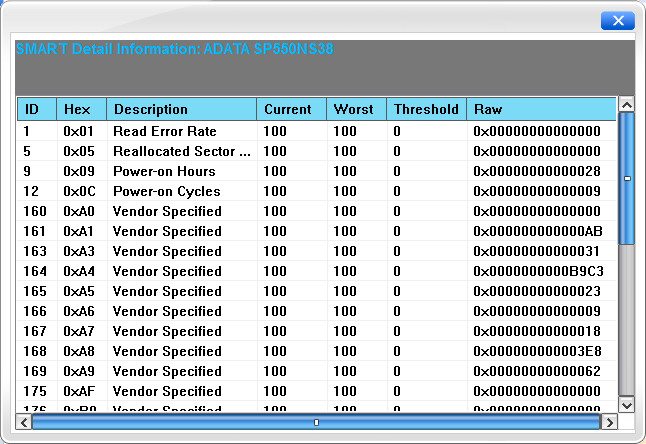
The diagnostics tools can quickly help identify possible trouble with your drive. Just hit the run button and wait for the result.
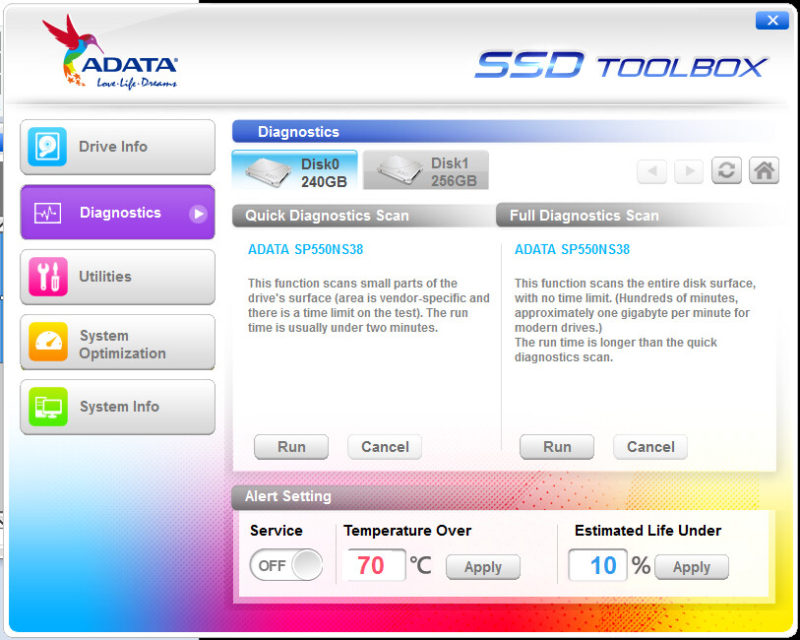
There’s also the feature to secure erase the drive, upgrade its firmware, upgrade the toolbox itself, and export log files from the drive.
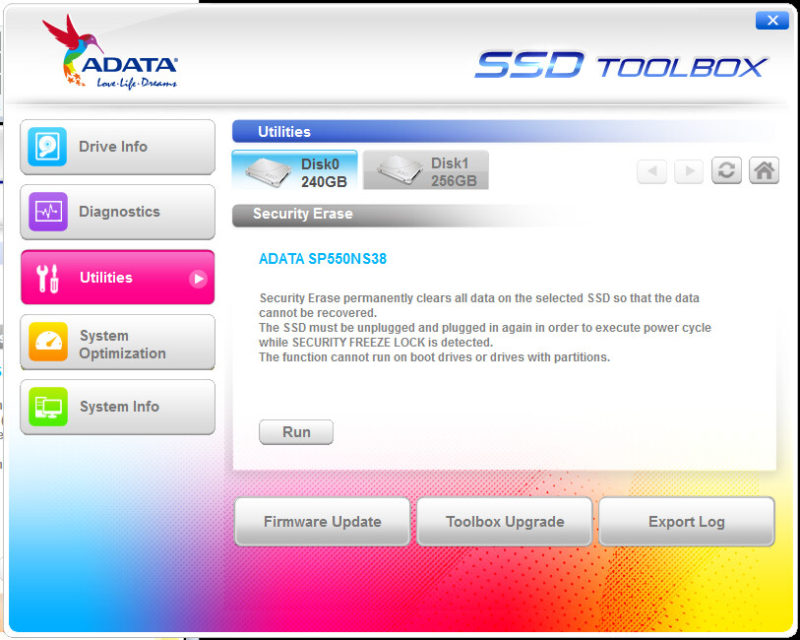
System optimization allows you to affect both the drive itself by sending the Trim command manually and optimize the system settings to work better with SSD drives.
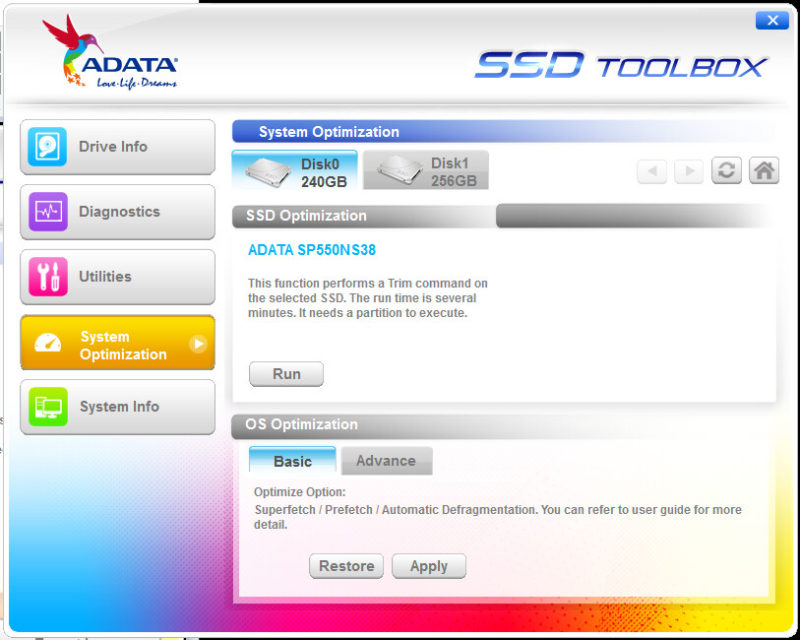
The last page contains general information about your system which might be needed to know during a possible support problem.
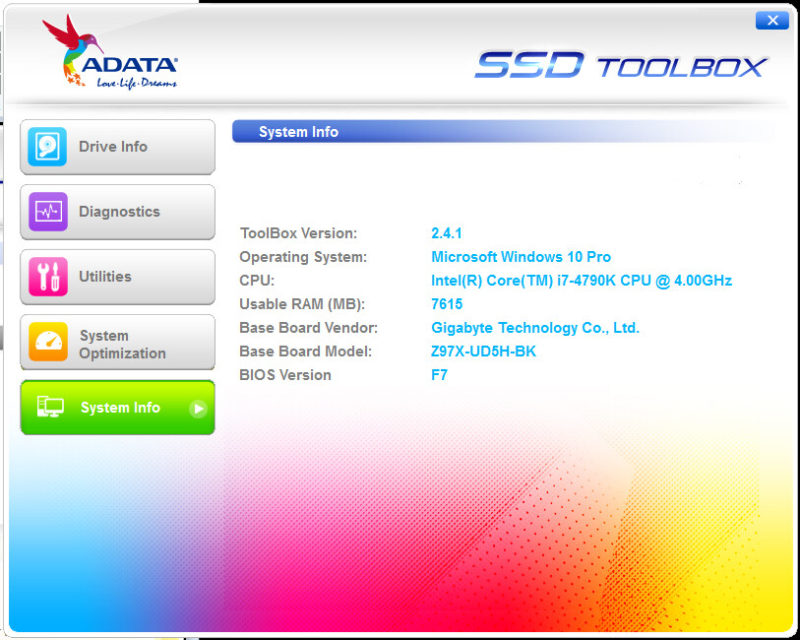
Final Thoughts
Pricing
The Adata Premier SP550 M.2 SSD with 240GB capacity will set you back $74.99 or £63.99 through Amazon at the time of writing.
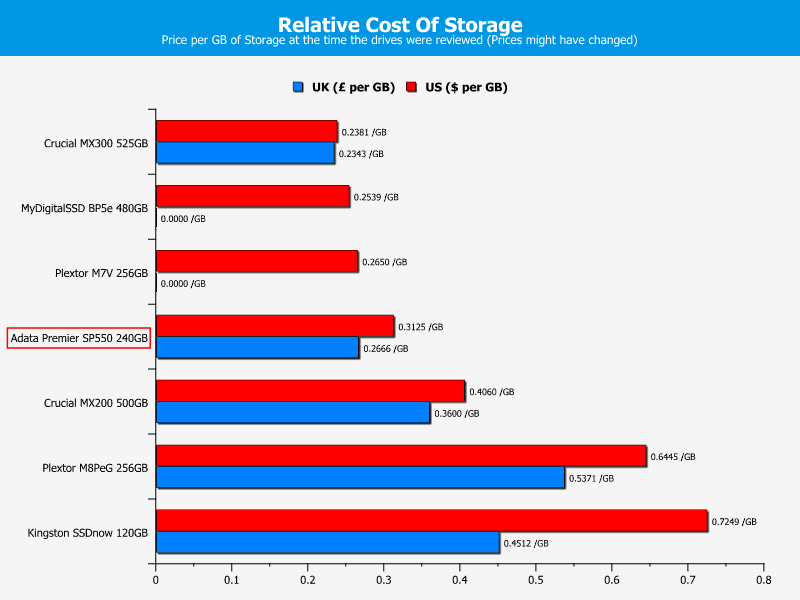
Overview
Adata’s Premier SP550 240GB M.2 2280 solid state drive is a simple drive that could serve you very well as hard disk replacement. It is the simplest form factor that you can get as the M.2 form factor eliminates the need for cables altogether and it is also the form factor for ultrabooks and thin netbooks – there simply isn’t room for anything bigger in those. And the latter is also one of the places where the SP550 M.2 shines and was made for as it comes with the Device Sleep function that will enhance the battery time.
The SP550 is built around the Silicon Motion SM2256 controller and with Adata TLC NAND and comes with great features such as SLC caching and DRAM buffer cache for improved performance. It also features RAID engine and data shaping for endurance and longevity. The SSD also comes with LDPC Error Correction Code (ECC). All that put together makes a great SSD.
Let us talk a bit performance too. The SP550 performs really great at most times, but there are a few drops in the performance here and there when the technologies behind the scenes are trying to catch up. In that regard, we should keep in mind that at the time of review, the drive has been on the market for quite some time and that the controller in use basically was the first one made for TLC NAND. That comes with some disadvantages which mostly are noticeable during continuous data transfers, i.e. copying a lot or large files at once. The speeds will drop below HDD levels after some time in this scenario. Other than that, it does good and would be a great addition or replacement for a mechanical hard drive. You’ll boot faster, you’ll use less power, and all your apps and games will load faster too. The latter is one of the areas where the SP550 M.2 shines and did very well in the benchmarks as the PC Mark 8 tests for games turned out some great results. When you play games, you read more data from the drive than you write and reading data is something that the SP550 is good at.
Pros
- Faster, lighter, and more efficient than HDDs
- Great read speeds and gaming performance
- SSD Toolbox software
- Fair price
Cons
- Low scores at continuous write operation
“The Adata SP550 is a drive with good features and perfect for ultrabook usage, but it can also serve you well as a boot drive in your stationary M.2 featured gaming system.”

ADATA SP550 M.2 240GB Solid State Drive Review
Thank You, ADATA for providing us with this sample.



















